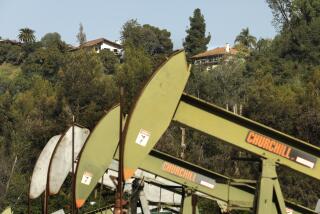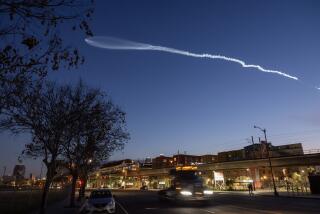U.S. Urged to Not Reduce Oil Rigs’ Inspections
- Share via
A Santa Barbara congresswoman urged the Bush administration Wednesday to reverse a decision to reduce the number of safety inspections on 23 offshore oil and gas platforms along California’s Central Coast.
The protest was made by Rep. Lois Capps (D-Santa Barbara) amid concerns among environmental groups that the cutback could increase the risk of spills along the coast from Vandenberg Air Force Base in northern Santa Barbara County to the Los Angeles-Long Beach area.
“Any effort to undermine safety and enforcement standards would be economically shortsighted and environmentally disastrous,” Capps wrote R. M. “Johnnie” Burton, director of the Interior Department’s Minerals Management Service.
But agency officials said cuts in the inspection program are aimed only at “maximizing resources” and insisted that current safety levels will be maintained although unannounced visits to the platforms have been reduced from 12 to four a year.
In addition to spot checks, federal inspectors are required by law to conduct one announced inspection a year, said John Romero, a Minerals Management Service spokesman in Camarillo, the regional headquarters for the agency’s West Coast operations. But the actual number of visits for all reasons is about once a month, he said.
Calling the monitoring program critical, Capps said that without a strong inspection program “many violations would go unreported, often with catastrophic results.” She cited 65 violations of the Clean Water Act at a Chevron platform in 1992. Full inspections should be immediately restored, she said.
One reason for the cutback, Romero said, was the increasing likelihood that 36 oil and gas leases off the Central Coast will not be developed because of a federal appeals court ruling last year that gave California the right to review lease extensions. Beyond that, he said, it was decided that greater efficiency could be achieved at no risk.
“Everybody in government is doing their best to maximize their resources,” Romero said. “We definitely need to maintain a regulatory presence offshore. But we have given this a lot of thought and are convinced we can do that more efficiently by flying out of one office instead of two and cutting back in a reasonable way.”
Inspectors will fly out of the Camarillo Airport seven days a week, but no longer from a Santa Maria office, Romero said. They will spend more nights on platforms to compensate for fewer unannounced visits, he said.
The Minerals Management Service has had responsibility for offshore oil platforms since it was established in 1982, Romero said. He added that since the 1969 oil spill in Santa Barbara that dumped thousands of gallons of oil on local beaches, the platforms in federal waters have leaked only 840 barrels of oil.
More to Read
Sign up for Essential California
The most important California stories and recommendations in your inbox every morning.
You may occasionally receive promotional content from the Los Angeles Times.













